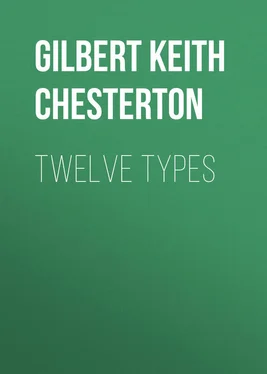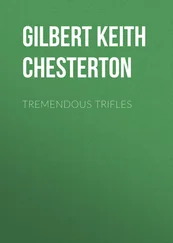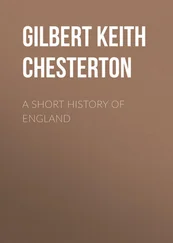Gilbert Chesterton - Twelve Types
Здесь есть возможность читать онлайн «Gilbert Chesterton - Twelve Types» — ознакомительный отрывок электронной книги совершенно бесплатно, а после прочтения отрывка купить полную версию. В некоторых случаях можно слушать аудио, скачать через торрент в формате fb2 и присутствует краткое содержание. Жанр: foreign_antique, foreign_prose, на английском языке. Описание произведения, (предисловие) а так же отзывы посетителей доступны на портале библиотеки ЛибКат.
- Название:Twelve Types
- Автор:
- Жанр:
- Год:неизвестен
- ISBN:нет данных
- Рейтинг книги:5 / 5. Голосов: 1
-
Избранное:Добавить в избранное
- Отзывы:
-
Ваша оценка:
- 100
- 1
- 2
- 3
- 4
- 5
Twelve Types: краткое содержание, описание и аннотация
Предлагаем к чтению аннотацию, описание, краткое содержание или предисловие (зависит от того, что написал сам автор книги «Twelve Types»). Если вы не нашли необходимую информацию о книге — напишите в комментариях, мы постараемся отыскать её.
Twelve Types — читать онлайн ознакомительный отрывок
Ниже представлен текст книги, разбитый по страницам. Система сохранения места последней прочитанной страницы, позволяет с удобством читать онлайн бесплатно книгу «Twelve Types», без необходимости каждый раз заново искать на чём Вы остановились. Поставьте закладку, и сможете в любой момент перейти на страницу, на которой закончили чтение.
Интервал:
Закладка:
G. K. Chesterton
Twelve Types
CHARLOTTE BRONTË
Objection is often raised against realistic biography because it reveals so much that is important and even sacred about a man's life. The real objection to it will rather be found in the fact that it reveals about a man the precise points which are unimportant. It reveals and asserts and insists on exactly those things in a man's life of which the man himself is wholly unconscious; his exact class in society, the circumstances of his ancestry, the place of his present location. These are things which do not, properly speaking, ever arise before the human vision. They do not occur to a man's mind; it may be said, with almost equal truth, that they do not occur in a man's life. A man no more thinks about himself as the inhabitant of the third house in a row of Brixton villas than he thinks about himself as a strange animal with two legs. What a man's name was, what his income was, whom he married, where he lived, these are not sanctities; they are irrelevancies.
A very strong case of this is the case of the Brontës. The Brontë is in the position of the mad lady in a country village; her eccentricities form an endless source of innocent conversation to that exceedingly mild and bucolic circle, the literary world. The truly glorious gossips of literature, like Mr Augustine Birrell and Mr Andrew Lang, never tire of collecting all the glimpses and anecdotes and sermons and side-lights and sticks and straws which will go to make a Brontë museum. They are the most personally discussed of all Victorian authors, and the limelight of biography has left few darkened corners in the dark old Yorkshire house. And yet the whole of this biographical investigation, though natural and picturesque, is not wholly suitable to the Brontës. For the Brontë genius was above all things deputed to assert the supreme unimportance of externals. Up to that point truth had always been conceived as existing more or less in the novel of manners. Charlotte Brontë electrified the world by showing that an infinitely older and more elemental truth could be conveyed by a novel in which no person, good or bad, had any manners at all. Her work represents the first great assertion that the humdrum life of modern civilisation is a disguise as tawdry and deceptive as the costume of a 'bal masqué.' She showed that abysses may exist inside a governess and eternities inside a manufacturer; her heroine is the commonplace spinster, with the dress of merino and the soul of flame. It is significant to notice that Charlotte Brontë, following consciously or unconsciously the great trend of her genius, was the first to take away from the heroine not only the artificial gold and diamonds of wealth and fashion, but even the natural gold and diamonds of physical beauty and grace. Instinctively she felt that the whole of the exterior must be made ugly that the whole of the interior might be made sublime. She chose the ugliest of women in the ugliest of centuries, and revealed within them all the hells and heavens of Dante.
It may, therefore, I think, be legitimately said that the externals of the Brontës' life, though singularly picturesque in themselves, matter less than the externals of almost any other writers. It is interesting to know whether Jane Austen had any knowledge of the lives of the officers and women of fashion whom she introduced into her masterpieces. It is interesting to know whether Dickens had ever seen a shipwreck or been inside a workhouse. For in these authors much of the conviction is conveyed, not always by adherence to facts, but always by grasp of them. But the whole aim and purport and meaning of the work of the Brontës is that the most futile thing in the whole universe is fact. Such a story as 'Jane Eyre' is in itself so monstrous a fable that it ought to be excluded from a book of fairy tales. The characters do not do what they ought to do, nor what they would do, nor, it might be said, such is the insanity of the atmosphere, not even what they intend to do. The conduct of Rochester is so primevally and superhumanly caddish that Bret Harte in his admirable travesty scarcely exaggerated it. 'Then, resuming his usual manner, he threw his boots at my head and withdrew,' does perhaps reach to something resembling caricature. The scene in which Rochester dresses up as an old gipsy has something in it which is really not to be found in any other branch of art, except in the end of the pantomime, where the Emperor turns into a pantaloon. Yet, despite this vast nightmare of illusion and morbidity and ignorance of the world, 'Jane Eyre' is perhaps the truest book that was ever written. Its essential truth to life sometimes makes one catch one's breath. For it is not true to manners, which are constantly false, or to facts, which are almost always false; it is true to the only existing thing which is true, emotion, the irreducible minimum, the indestructible germ. It would not matter a single straw if a Brontë story were a hundred times more moonstruck and improbable than 'Jane Eyre,' or a hundred times more moonstruck and improbable than 'Wuthering Heights.' It would not matter if George Read stood on his head, and Mrs Read rode on a dragon, if Fairfax Rochester had four eyes and St John Rivers three legs, the story would still remain the truest story in the world. The typical Brontë character is, indeed, a kind of monster. Everything in him except the essential is dislocated. His hands are on his legs and his feet on his arms, his nose is above his eyes, but his heart is in the right place.
The great and abiding truth for which the Brontë cycle of fiction stands is a certain most important truth about the enduring spirit of youth, the truth of the near kinship between terror and joy. The Brontë heroine, dingily dressed, badly educated, hampered by a humiliating inexperience, a kind of ugly innocence, is yet, by the very fact of her solitude and her gaucherie, full of the greatest delight that is possible to a human being, the delight of expectation, the delight of an ardent and flamboyant ignorance. She serves to show how futile it is of humanity to suppose that pleasure can be attained chiefly by putting on evening dress every evening, and having a box at the theatre every first night. It is not the man of pleasure who has pleasure; it is not the man of the world who appreciates the world. The man who has learnt to do all conventional things perfectly has at the same time learnt to do them prosaically. It is the awkward man, whose evening dress does not fit him, whose gloves will not go on, whose compliments will not come off, who is really full of the ancient ecstasies of youth. He is frightened enough of society actually to enjoy his triumphs. He has that element of fear which is one of the eternal ingredients of joy. This spirit is the central spirit of the Brontë novel. It is the epic of the exhilaration of the shy man. As such it is of incalculable value in our time, of which the curse is that it does not take joy reverently because it does not take it fearfully. The shabby and inconspicuous governess of Charlotte Brontë, with the small outlook and the small creed, had more commerce with the awful and elemental forces which drive the world than a legion of lawless minor poets. She approached the universe with real simplicity, and, consequently, with real fear and delight. She was, so to speak, shy before the multitude of the stars, and in this she had possessed herself of the only force which can prevent enjoyment being as black and barren as routine. The faculty of being shy is the first and the most delicate of the powers of enjoyment. The fear of the Lord is the beginning of pleasure.
Upon the whole, therefore, I think it may justifiably be said that the dark wild youth of the Brontës in their dark wild Yorkshire home has been somewhat exaggerated as a necessary factor in their work and their conception.
Читать дальшеИнтервал:
Закладка:
Похожие книги на «Twelve Types»
Представляем Вашему вниманию похожие книги на «Twelve Types» списком для выбора. Мы отобрали схожую по названию и смыслу литературу в надежде предоставить читателям больше вариантов отыскать новые, интересные, ещё непрочитанные произведения.
Обсуждение, отзывы о книге «Twelve Types» и просто собственные мнения читателей. Оставьте ваши комментарии, напишите, что Вы думаете о произведении, его смысле или главных героях. Укажите что конкретно понравилось, а что нет, и почему Вы так считаете.










